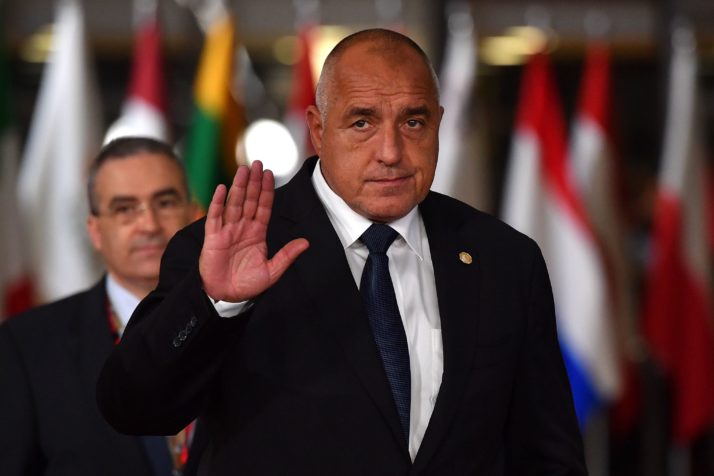PRAGUE — Decades after the fall of the Iron Curtain, Radio Free Europe is back — to bring media freedom to the EU.
The U.S. government-funded news outlet will resume its Hungarian-language reporting later this year, after restarting its Romanian and Bulgarian-language operations in 2019.
At a time when Brussels is struggling to address rule-of-law concerns in some member countries, American taxpayer dollars are being mobilized to try to free the flow of information in three of the EU’s eastern members.
„We’re not saying with our return that these are countries where there is no media plurality, because there are in most of these cases diversity of media options,“ said Jamie Fly, president and CEO of Radio Free Europe. „The question is, are those media outlets able to report on issues in an objective, balanced way“ and „explore politically sensitive issues?“
Watchdog groups and journalists over the past few years have raised concerns about the media environment in Bulgaria, Romania and Hungary, while American officials say they are worried about the spread of Russian disinformation in the region. Last year, U.S.-based think tank Freedom House ranked Hungary as „partly free“ for the first time since the fall of communism.
Since its return to now-EU members, Radio Free Europe’s impact has been most felt in Bulgaria.
Founded in 1950, Radio Free Europe currently operates in 26 languages. With a budget of $124 million in 2019, it reaches an estimated 37.6 million people per week. While its new iteration in the three EU countries is digital-only and relies on small teams, Radio Free Europe’s Cold War legacy means it is still a well-known brand across the region.
Fly — a former think-tanker who previously worked for Republican Senator Marco Rubio and as a director at the U.S. National Security Council under President George W. Bush — spoke to POLITICO in his office at Radio Free Europe’s heavily secured compound in a quiet Prague neighborhood. He said he wants the station’s reporters in Bucharest, Sofia and Budapest to avoid the beaten track.
„We want to cover topics that are being neglected by existing media outlets, maybe for political bias reasons, but also … in some of those countries, because the independent media feels that they are not strong enough to tackle politically sensitive issues without potential repercussions,“ he said.
Back to the future
Since its return to now-EU members, Radio Free Europe’s impact has been most felt in Bulgaria, a country that Reporters without Borders has flagged as one where „corruption and collusion between media, politicians and oligarchs is widespread“ and „journalism is now dangerous.“

Bulgaria’s Prime Minister Boyko Borissov welcomes the return of Radio Free Europe | Ben Stansall/AFP via Getty Images
In its first year, Radio Free Europe’s Bulgarian-language service — known locally as Svobodna Evropa — produced a series of reports into prominent figures who obtained apartments at low prices, an investigation that contributed to the resignation of a host of high-ranking officials, including the country’s justice minister. Svobodna Evropa also reached almost 10 percent of Bulgaria’s digital population, with over 3.6 million unique visitors, according to Radio Free Europe’s own data.
„The situation in Bulgaria is really, really tough,“ said Rossen Bossev, a reporter at the weekly paper Capital. „When they [Radio Free Europe] publish an investigation, in most cases it’s followed up by other independent outlets,“ Bossev added, noting that while the news outlet’s journalists have faced smear campaigns in Bulgaria, its connection to the American government means „they are better protected than us.“
Bossev, who was convicted of defamation last year and is now filing a complaint at the European Court of Human Rights, also noted that Radio Free Europe’s close coverage of his trial raised awareness of the case.
Bulgaria’s government, however, maintains that the country meets media freedom standards.
„The Bulgarian government respects the work of all media in the country and appreciates their corrective role for any administration,“ said a government statement, noting that Prime Minister Boyko Borissov met with Fly late last year. „The Bulgarian Prime Minister said that he welcomes the resumption of this esteemed broadcasting agency’s operation in Bulgaria. In Mr. Borissov’s opinion Radio Free Europe’s presence is a further indication of the Bulgaria-U.S. good cooperation in all sectors.“
„Borissov holds the view that freedom of speech should be promoted as a fundamental Constitution-enshrined right, including respect for journalists and non-interference,“ the statement said.
In Romania, Radio Free Europe’s experience has been different: Over the past year the outlet has been navigating a bureaucratic maze in an effort to register as a nonprofit — a prerequisite for addressing corporate matters like leases and full-time staff — and is now expecting to be registered in March. In its first year, the Romanian-language service garnered 3.8 million unique visitors, according to Radio Free Europe data.
While formally the governments of Bulgaria, Romania and Hungary are not opposing Radio Free Europe’s renewed operations, some officials have greeted the outlet’s return with open skepticism.
„There is good reporting in Romania, there is good journalism, but it doesn’t reach many people,“ said Dumitrita Holdis, a researcher at the Central European University Center for Media, Data and Society, pointing out that television — where many Romanians get their news — has „very poor quality reporting“ while some good investigative journalism can be found in online media. Nevertheless, Radio Free Europe „didn’t get much attention“ upon its return, Holdis said.
The government in Bucharest says that it supports free press and that Radio Free Europe’s registration process is underway.
„The Romanian Government promotes the freedom of expression as a fundamental right of the citizens,“ the government’s press office said, noting that the government „supports all media outlets that promote accurate, impartial information and balanced debates on topics of public interest.“
The previous Romanian government issued a formal decision on the outlet in October 2019, the statement said, adding that moving forward „Radio Free Europe Organization/Radio Liberty, INC., will carry out its activity, through its office in Romania, in compliance with the Romanian laws, after receiving the judicial decision on the recognition of its operation here, and registration in the Registry of associations and foundations with the clerks’ office at the Bucharest Tribunal.”
And while formally the governments of Bulgaria, Romania and Hungary are not opposing Radio Free Europe’s renewed operations, some officials have greeted the outlet’s return with open skepticism.
„Radio Free Europe gets it wrong if they think Hungarians will give their outlet a positive reception,“ Hungarian Foreign Minister Péter Szijjártó told the New York Post last year.
The Hungarian government did not respond to questions from POLITICO.
Eyes on Brussels
Fly says that EU decision-makers need to be more alert.
„I know no one in the EU likes to hear Americans — especially in this day and age — lecture them on things like this, but this is an area where I think the EU and EU member states should pay much more attention: to the state of media freedom,“ he said.
„My worry … is that there’s now this system that once you’re in the club, there’s an unwillingness to have some of these fraught conversations and even broach issues,“ he added, pointing out that the EU is a big player in supporting media freedom in neighboring countries outside the bloc.
But the European Commission says it is doing what it can for media freedom — within its competence.
„It is first of all the responsibility of member states to protect media freedom and pluralism within their respective country,“ a Commission spokesperson said.

Hungarian Foreign Minister Péter Szijjártó | Attila Kisbenedek/AFP via Getty Images
„The Commission, however, can act as a facilitator and supports initiatives which notably map media freedom in the EU, provide assistance to journalists and disseminate knowledge about media freedom,“ the spokesperson said, noting that initiatives to strengthen media freedom will be part of the planned European Democracy Action Plan.
The Commission has announced several pilot projects to promote media freedom, including a €1.4 million cross-border investigative journalism fund and a €1.275 million fund for providing support to independent, collaborative journalism within the EU.
Moreover, under the Commission’s proposal for the EU’s 2021-2027 budget, €61 million would be dedicated to, among other things, „enhancing a free, diverse and pluralistic media environment, quality journalism and media literacy.“
Geopolitical considerations
While Radio Free Europe is funded by the U.S. Congress, recommendations about expansions are made by the U.S. Agency for Global Media — the body overseeing Radio Free Europe/Radio Liberty, Radio Free Asia, Voice of America, the Office of Cuba Broadcasting and the Middle East Broadcasting Networks — which analyzes the state of media freedom around the world with input from the U.S. State Department.
Concerns about the Kremlin’s role in the region also played a major role in the decision to expand to Hungary.
„The stated motivation for reopening the Romania bureau was to counter Russian malign influence,“ said one American official, who spoke on condition of anonymity. „Romania is kind of contradictory — it’s the least susceptible place to Russian influence in the region in many ways, but it’s also a strategically important target.“
Concerns about the Kremlin’s role in the region also played a major role in the decision to expand to Hungary.
„There’s long been acknowledgement that disinformation is making its way into media in the region, for example via Sputnik and Russia Today, and that then gets circulated into much of the media writ large,“ said a second American official.
„Russia considered opening an RT service [in Hungary] but decided it was unnecessary because the Hungarian media ecosystem already pushed their agenda,“ the official said. The idea behind Radio Free Europe’s return „is to counter disinformation,“ the official added.
Source: politico.com
See more here: news365.stream






